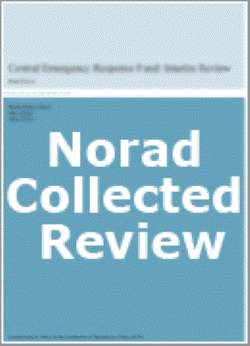Mid-term Review Ethio-Norwegian UNCCD
Om publikasjonen
- Utgitt: januar 2010
- Serie: Norad-innsamlede rapporter
- Type: --
- Utført av: Leif Tore Trædal, Adviser, Norad, Dr. Yohannes Gebre-Michael, Consultant, University of Addis Abeba
- Bestilt av: The Development Fund of Norway and the Royal Norwegian Embassy in Addis Abeba
- Land: Etiopia
- Tema: Klima og miljø, Primærnæring (landbruk fiske skogbruk)
- Antall sider: 48
- Serienummer: 27/2009
- ISBN: 978-82-7548-475-6
- ISSN: --
- Prosjektnummer: ETH 06/039

The Project
The Royal Norwegian Embassy in Ethiopia has since 2007 been funding an Ethio-Norwegian UNCCD Program implemented by Norwegian Development Fund (DF) in collaboration with various partners in the Afar and Somali regions. In the Program, DF is currently collaborating with 13 partners, 10 in the Afar Regional State and 2 in the Somali Region, with the main goal of: “Implementation of the United Nations Convention to Combat Desertification in Afar and Somali regions of Ethiopia”. Main objectives have been to promote sustainable land management and improve pastoral livelihoods in the targeted areas.
Interesting Findings
In summary the Team found that much has been achieved so far, and that the Program activities by and large are on track and according to schedules and work plans. Considering the challenging context, working environment and short period of time, both DF and DF partners have made remarkable progress and achievements in terms of outputs achieved and number of new partners identified. DF is also perceived to be doing a good job in following up the partners in the field, and giving partners high degree of flexibility in project planning and reporting.
The review identified some gaps in the Program’s results framework. The main framework including the Program goal, objectives and outputs should be revisited in order to make them more operational and more logically linked to each other. Strategic indicators linked to a Program baseline should also have been established for the Program on an aggregate level. As the result framework stands now the program will face problems on reporting on actual outcomes at the end of the program period. A ‘results management’ exercise where a comprehensive results framework and monitoring and evaluation plan are developed would be useful for the Program.
As there are two years left of the Program, it is difficult to make a proper assessment of the Program effectiveness. Still, a concern is a perceived weak programmatic approach, caused by thematic and geographic proliferation of the Program activities. It would be recommended that DF aims at stimulating a higher degree of cooperation, and creating synergies between partners and activities. Leaders for thematic and geographic areas could also be identified. This could in the long run also relieve DF’s following-up of Program partners in the field and also improve the sustainability of the Program.
For some of the observed activities, the Team questions whether all DF partners have sufficiently internalized the concept of pastoralism. This seems to have had some potentially negative impacts on pastoralist mobility, as many project activities most likely will imply some form of sedentarisation of beneficiaries. The Review Team in general agrees with DF strategy of livelihood diversification and bottom-up approach, but believes that interventions such as promoting agriculture and area enclosures should not only be based on community request, but also on sound and in-depth studies and knowledge about the local pastoral system(s).
